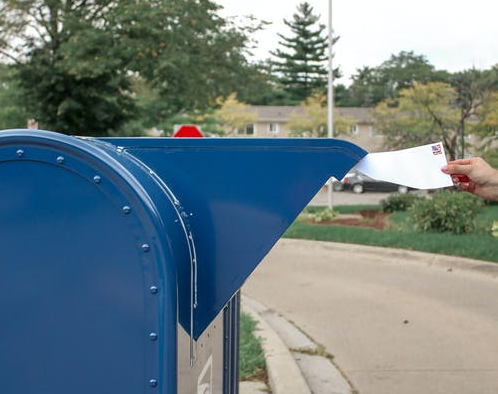latest
Massachusetts House Approves Permanent Extension Of Voting Reforms

By Matt Murphy
The state’s mostly successful experiment with voting-by-mail during the COVID-19 pandemic would become a permanent option for voters in future elections, but House lawmakers on Thursday passed a major voting access bill that omitted voter registration rule changes sought by advocates and the Senate.
The House voted 124-34 to pass a new version of the VOTES Act that establishes rules for voting-by-mail in all future state and presidential elections and expands early in-person voting opportunities.
Those voting reforms were deployed during the pandemic to try to keep people safe from the virus, and led to record turnout in the 2020 elections, though MassGOP Chairman Jim Lyons on Thursday called it “an invitation for fraud” that would make it “easier to cheat.”
Assistant Majority Leader Michael Moran said that if signed into law the House version of the VOTES Act would put Massachusetts “head and shoulders above every other state” in terms of voting access. The Senate passed a similar bill in October, and the two branches must now negotiate a final bill.
“This is another step forward in this commonwealth’s commitment to having a world class election system where we engage and bring people and provide them the ability to participate in our elections on so many levels,” Moran said.
House leaders resisted a push from inside and outside the State House to allow eligible voters to register and vote on the same day, a practice used in at least 20 other states and the District of Columbia. Critics, including some lawmakers, said the opposition came from a desire to protect incumbents from primary challenges.
The House bill (H 4359) would shrink the registration blackout period from 20 days prior to an election to 10 days, giving eligible voters, including new voters and those who might have moved, more time to register.
After more than two hours of back-and-forth debate, lawmakers voted 93-64 in favor of an amendment that would direct Secretary of State William Galvin, who supports same-day registration, to conduct a comprehensive study – without a deadline – of what it would take for clerks to implement same-day registration and how much it would cost the state and municipalities.
That amendment offered by Moran superseded a vote on same-day registration, and a different amendment offered by Rep. Nika Elugardo of Boston as a “solid compromise” that would have only allowed voters to register and vote at the same time on Election Day.
Advocates argued that same-day registration has the potential to increase participation in elections, particularly among young and minority voters. Some Democrats countered with their concerns about the ability of cities and towns to implement the proposed new registration rules without disruption, potentially putting a cloud over the integrity of state elections.
The Massachusetts Town Clerks Association opposed same-day registration as a “nearly impossible” challenge to implement, but came out Thursday in support of an amendment to implement election-day registration, which would limit the practice to one day instead of the entire 10-day early voting window before some elections.
Acknowledging the votes might not be there for same-day registration, Elugardo said election-day registration represented a “solid compromise,” and would put the House on good footing as it enters negotiations with the Senate over a final bill. The Senate include the registration reform in its voting bill last October.
Elugardo could not, however, convince her colleagues to buck House leadership and force a vote on her amendment.
“Even if a study happens, we’re just back where we are today and we start over,” Elugardo said, later adding, “The increases in turnout that we’re codifying today have been concentrated in communities that don’t include people who are Black, indigenous and other people of color.”
Other Democrats, including Reps. Erika Uyterhoeven and Tami Gouveia, said keeping an arbitrary deadline to register to vote would disenfranchise thousands of voters. Uyterhoeven said the rule had its roots in Jim Crow laws that were designed to keep Black and poor people from voting, and she warned that Democrats could “pay a price on election day” in November if they didn’t act.
“We have a commitment to ensure our communities of color are not forgotten in our laws,” she said.
Moran defended the study and the state’s record on voter access, saying that the only state that has same-day registration and all the policies in place in Massachusetts – including automatic voter registration, pre-registration for teens, online registration and early voting – is Delaware.
The Brighton Democrat also said too much is unknown about the staffing and training needs to implement same-day registration across 2,173 precincts, 1,220 polling locations and 391 early voting sites.
“All of those would need to be looked at to see how they could appropriately carry out the process of same-day voter registration and in many, many, many of those locations they’ve never even considered it,” Moran said.
Rep. Mike Day, a Stoneham Democrat and House chair of the Judiciary Committee, lamented that the debate over same-day registration was causing people to “lose sight” of the progress the overall bill would make.
“You want same-day or election day registration? Let’s figure it out. That what this amendment does,” Day said, calling it “absurd” for anyone to suggest that they were erecting barriers to voting.
Rep. Dan Ryan, the House chair of the Committee on Election Laws, said at the start of the debate that he knew the bill would not make everyone happy.
“Will we deliver a perfect bill today? No. Ideals and perfection cannot serve as a speed bump to moving democracy forward,” Ryan said.
Ryan discussed the Jan. 6, 2021 attack on the U.S. Capitol, efforts in some states to further restrict voting and the inability of Congress to pass the John Lewis Voting Rights Act, describing the country as being as a “constitutional crossroads.”
“As other states in this fragile union take two giant steps backwards after tiny steps forward, we here in Massachusetts will continue forward with the steady drumbeat of progress,” said Ryan, a Boston Democrat.
In addition to enshrining voting by mail and expanded early voting, the bill would direct correctional facilities to assist eligible incarcerated voters in accessing and casting ballots.
An amendment sponsored by Rep. Liz Miranda passed with overwhelming support by a vote of 153-5 to strengthen jail-based voting by requiring jails and prison to put an official in charge of voter outreach, to report on visiting participation and to provide education on voting rights as part of the release process for inmates.
“The voter suppression of yesterday may look different than voter suppression today, but it’s here..,” Miranda said. “This amendment would curb the current practice of de facto disenfranchisement.”
Minority Leader Brad Jones, a North Reading Republican, fell short in his effort to seek an opinion from the Supreme Judicial Court on the constitutionality of the bill, and to delay its implementation until that opinion is delivered.
Jones said his concern is that the Constitution allows for absentee voting if a voter has a religious reason, a disability or will not be present on election day to otherwise cast a ballot in person.
While the COVID-19 pandemic was treated as a “disability” for all voters during the state of emergency, Jones said, he worries that permanently allowing voting-by-mail could run afoul of the constitution.
Ryan said the bill had been vetted by lawyers in the House and urged against any further delay. The amendment failed 30-128.
The House also rejected another Jones amendment enhancing penalties and creating mandatory minimum fines and possible jail time for voter fraud, a Rep. Paul Frost amendment requiring voter identification, and an amendment offered by Rep. James Kelcourse proposing to move the mail-in ballot application process online.
The House also voted 127-31 to reject a Rep. Peter Durant amendment banning municipalities from requiring proof of vaccination against COVID-19 to enter a voting location or vote in-person. Durant said some voters might run into problems due to vaccine mandates, but Rep. Ryan called it a “solution in search of a problem.”
-

 Community6 years ago
Community6 years agoNational Shrine of La Salette Festival of Lights 2017 set to begin
-

 Community6 years ago
Community6 years agoMassachusetts State Police looking for good home for retired dogs
-

 Crime6 years ago
Crime6 years agoFall River ranked most dangerous city in Massachusetts according to report
-

 latest6 years ago
latest6 years agoDurfee student allegedly overdoses on marijuana
-

 Community6 years ago
Community6 years agoVideo of Fall River Police goes viral
-

 Causes6 years ago
Causes6 years agoMissing Fall River woman found deceased
-

 Crime6 years ago
Crime6 years agoFall River Police add names to most wanted list
-

 Causes6 years ago
Causes6 years agoFall River teenager reported missing has been found




MortisMaximus
January 29, 2022 at 9:34 pm
Mass politicians have sold out their constituents and are implementing total fraud in Mass elections into the future. We are screwed!
MitzySkritzy
January 30, 2022 at 7:08 pm
Mass. uses Dominion machines, doesn’t matter what laws are passed matters who counts the votes…
david
January 29, 2022 at 11:59 pm
“Voting Access” as if there are unknown forces blocking access to voting
This is about ensuring democrats can continue to steal elections.
Rocso17
January 31, 2022 at 2:20 pm
Here is an idea!! Put this on the ballot…..let the people vote on whether or not the people want mail voting….. it’s pure fraud!!
MortisMaximus
January 31, 2022 at 7:11 pm
Doesn’t matter if there is fraud in our elections as long as it is Democrat run. The left like satanic cultists just keep repeating ” The Big Lie”. Has anyone checked on any of the evidence that has been shown of absolute fraud? It is no longer a secret that Washington D.C. is the home of the UNIPARTY! Why would anyone want to walk away from the greatest water supply in history? The fool would be thirsty. Not these political demons in Washington, they hoarde the supply of clean water. The system is no longer looking out for you! Prove it otherwise instead of personal attacks and rhetorical word Salads provided by Brian Stelter and Rachel Maddow. Everyone is drowning in the Governments debt, gasp for your last breath it is over for you!